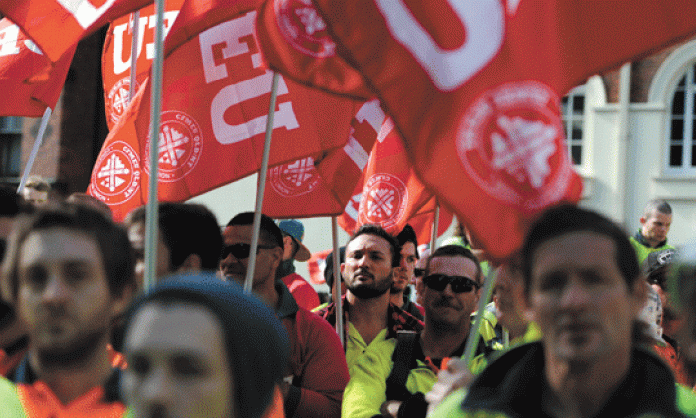“They need a killer blow and if they don’t land a killer blow, it gives strength to the claims by the unions and the Greens that this is nothing more than a witch-hunt.” So said “a senior industry figure”, speaking to the Australian Financial Review.
Staunch business supporters of the Royal Commission into Trade Unions are questioning the ability of its lawyers to ask the right questions, “do their homework” or even understand how unions work. They fear that the commission doesn’t have the capacity to hobble the unions.
Worse, in their eyes, is that the commission risks becoming a laughing stock. One business figure told the AFR’s Ewin Hannan: “Australians like a larrikin. They like it when someone gives the two-fingered salute to the boss, particularly if you are being seen to do it to protect workers. At the moment, the commission is struggling to show that the CFMEU are no more than naughty boys.”
Frustratingly for the bosses, there’s been little return for the millions spent on this lawyers’ circus. While pages and pages of hearsay and fabrication fill the transcripts of the hearings, actual evidence is rare indeed. Take Victoria’s police chief, whose entire case alleging deep bikie links with the CFMEU was a newspaper picture of a union member with tattoos at a demonstration. You can see the problem.
Apart from hearings, the commission has released a number of reports, the latest by counsel Jeremy Stoljar on 19 May. The discussion paper, “Options for law reform”, combines paper-thin justifications for law changes with “evidence” from aggressive anti-union employers (such as Boral’s boss Mike Kane) and a forensic listing of any and every law (including the 1799 anti-union Combination Acts) not already canvassed by the commission that could target union activities.
It paints unions as large commercial organisations outweighing employers and unfairly receiving tax and other exemptions. “In short,” it concludes, “trade unions and their officials currently occupy a privileged position in Australia’s industrial relations systems”.
One strength of unions that the ruling class has long railed against is access to funds of members’ money. Tony Abbott has described union-linked superannuation as being run by “venal” and “corrupt” union officials. Not surprisingly, the report is quick to smear the unions, writing: “Union officers have control over substantial sums of what can loosely be described as ‘members’ money’. Control of someone else’s money can create a strong temptation to misapply it”.
This becomes the launching pad for an all-out attack on the various union election funds and union influence in superannuation. In the name of members’ rights and greater democracy, the paper examines more ways to penalise or restrict unions.
A particular target is union right of entry – a “serious encroachment upon liberty” of employers, according to the paper. It proposes criminalising so-called breaches of right-of-entry permits. The police would be given move-on powers, and if organisers did not leave a job within 15 minutes, they would be charged and would face time in jail or a fine.
Conviction for such an offence would be an automatic ground for disqualification from office. It doesn’t take genius to work out what a serious threat to union organising this would be.
Some of its fire is directed at unions’ political activity, smearing all activity as tantamount to misconduct or corruption. It describes union officials as “wielding substantial political power” and follows immediately with “misconduct by a trade union official”.
Under the guise of concern about the potential for misuse of this union power to affect “workers, third parties or the broader political process”, the paper expresses concern and sometimes outrage over union influence in the ALP, such as in preselection and party and government policy.
Accompanying all this is a call for greater penalties. Apart from proposing huge increases in fines and other penalties, the paper deliberates on how to disqualify union officials from holding office. All kinds of “contraventions of the law”, including contempt of court for continuing industrial action, the report argues, should enable the courts or another third party (such as employers) to bring on harsher penalties and disqualification.
Not surprisingly, Boral, which has been embroiled in a long battle with the CFMEU, and the Master Builders Association have encouraged this approach in their submissions to the commission.
After all the attacks on unions and the call for increased penalties while leaving companies relatively untouched, it may seem strange that the paper also calls for $17 million fines for companies doing deals with unions.
However, the purpose of this is to enforce employer solidarity against unions’ bargaining power. In particular, it aims to stop the practice of some employers contributing to training programs run by the unions. (Unions such as the MUA have won these contributions, in part to make up for the slashing of TAFE and other training facilities for blue collar workers.)
Not all of the ruling class’s hopes are pinned on the commission. Since the Abbott government came to power, it has launched a number of attacks on the unions and workers. Whether it’s Abbott’s suggestion that bosses “try before they buy” workers on the work for the dole scheme, encouraging the unfettered exploitation of visa workers, attacking penalty rates, introducing amendments to the Fair Work Bill to re-introduce individual contracts or the Productivity Commission’s investigations – this government has all its anti-worker weapons lined up against us.
The federal special minister of state, Michael Ronaldson, has now launched a parliamentary inquiry into “practices at polling booths” such as handing out how-to-vote cards by organisations other than political parties. This is a blatant attack on rights of unions and their members to take a political stand and has undoubtedly been brought on by the recent electoral campaigns by unions in Queensland and Victoria.
The CFMEU’s national secretary, Dave Noonan, sums up the Coalition’s visceral class hatred of any industrial or political rights of workers and their unions: “They don’t accept the legitimacy of the Labor Party or unions. On Planet Stoljar [or Planet Abbott] unions have a right to exist as long as they have no power to assist workers or change society”.
Our side needs fighting trade unions that can deliver a killer blow against the ruling class offensive.











